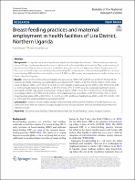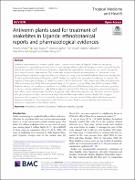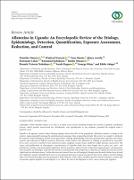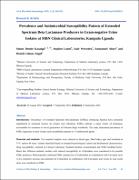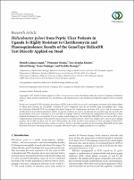Research Articles
Browse by
Recent Submissions
-
Safety, Toxicological and Allergenic Aspects of Using Algae for Food
(Springer, 2024)Consumption of algae has been historically practiced, especially in East Asia and the Pacific region cultures. However, sporadic events and empirical studies have suggested that some compounds could be triggering intoxications, ... -
Breast‑feeding practices and maternal employment in health facilities of Lira District, Northern Uganda
(Bulletin of the National Research Centre, 2022)Background: In Uganda, many working mothers stop breast-feeding before the end of the mandatory maternity leave of 60 days. Inadequate breast-feeding is a risk factor for infant morbidity and mortality. Thus, understanding ... -
Antivenin plants used for treatment of snakebites in Uganda: ethnobotanical reports and pharmacological evidences
(Tropical Medicine and Health, 2020)Snakebite envenomation is a serious public health concern in rural areas of Uganda. Snakebites are poorly documented in Uganda because most occur in rural settings where traditional therapists end up being the first-line defense ... -
Aflatoxins in Uganda: An Encyclopedic Review of the Etiology, Epidemiology, Detection, Quantification, Exposure Assessment, Reduction, and Control
(International Journal of Microbiology, 2020)Uganda is an agrarian country where farming employs more than 60% of the population. Aflatoxins remain a scourge in the country, unprecedentedly reducing the nutritional and economic value of agricultural foods. *is review ... -
Prevalence and Antimicrobial Susceptibility Pattern of Extended Spectrum Beta Lactamase Producers in Gram-negative Urine Isolates at MBN Clinical Laboratories, Kampala Uganda
(Archives of Microbiology & Immunology, 2018)Introduction: Occurrence of Extended Spectrum beta-lactamase (ESBLs) producing bacteria have presented impediment in treatment choices for urinary tract infections. ESBLs embody a major cluster of lactamases accountable ... -
Helicobacter pylori from Peptic Ulcer Patients in Uganda Is Highly Resistant to Clarithromycin and Fluoroquinolones: Results of the GenoType HelicoDR Test Directly Applied on Stool
(BioMed Research International, 2017)Background. Around 70–90% of peptic ulcer disease (PUD) is due to Helicobacter pylori and requires treatment with antimicrobials to which these bacteria are susceptible. Common H. pylori diagnostic tests do not provide ...


